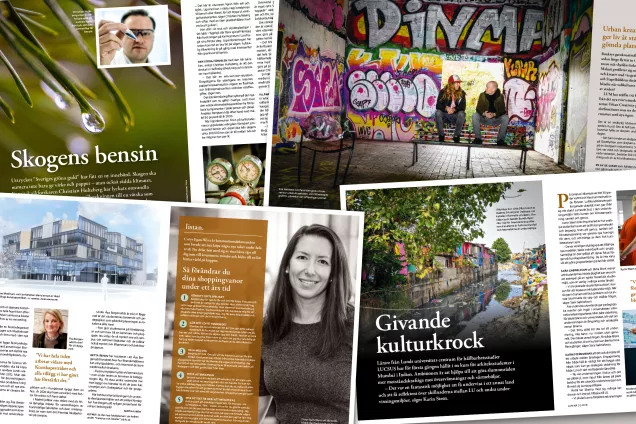Anna Pardo is a psychologist, registered psychotherapist and psychotherapy supervisor at the Department of Psychology. She has extensive experience of supervising university staff and prospective psychologists and psychotherapists, as well as various staff groups within the healthcare sector. A large part of the supervision, of both lecturers and psychotherapists, is about learning how to take care of yourself at work.
“Constantly relating to many different people and perhaps meeting several groups in one day, where each group wants you to bring your A-game, requires a lot of energy”, says Anna Pardo, adding that these are the groups in which sick leave is the most common.
In the previous issue of LUM, we wrote about sick leave due to stress. This time we are following up with an approach to oneself that reduces stress, but it may take time and effort. It is about silencing that inner self-critical voice that most of us have. Self-criticism is not about identifying that you have done something wrong, and reflecting on how to do better in the future – that’s a healthy attitude. Self-criticism is about constantly beating yourself up about things, both big and small.
“Self-criticism creates a trap. Many believe it serves a purpose – that is makes us perform better the next time, but self-criticism creates stress and anxiety just like when we’re criticised by other people. In a situation that we perceive as threatening, we don’t have the same access to our brain that we normally do – it doesn’t make us perform better.”
Anna Pardo says that although threats and punishments against oneself – and others – could have a short-term effect on performance, in the long run they do not work, but instead risk leading to mental ill health. You often need to address deep-rooted patterns to become kinder and calmer towards yourself. If you have been criticising yourself for decades – saying things like “you’re such a klutz” or “I should’ve done more”, or “I’m totally useless” – it will take a lot of work and time to silence that inner self-critical voice.
“I often say it’s like you’ve been running a massive advertising campaign against yourself for all these years, and now you’re suddenly supposed to sell something else.”
Self-compassion is part of self-care, for which there are two aspects. Firstly, the practical aspect which may seem obvious: taking care of your organism, that is, your sleep, body and health.
“But people who are stressed often don’t do that, instead they work without taking breaks, schedule meetings during lunch-time and avoid dealing with their sleep disorders, for example.”
Secondly, the emotional aspect, that involves self-compassion, is about showing consideration for yourself and what you need to feel healthy and secure to avoid ending up in a situation that you perceive as threatening, which leads to feelings of dejection and stress.
“If a colleague has forgotten or failed to do something, you would never scold them for being forgetful or sloppy. But when it comes to ourselves, we are often judgemental.” Anna Pardo further argues that we all need to reflect on our lives and what is really important to us. Perhaps there needs to be room for something other than performance, such as yourself.
“What do I do for myself each day? Everyone needs active rest, and to do things that they enjoy doing. What these things are may differ, but they rarely involve doing more of the same – more work, that is.”
Anna Pardo is consulted by employers who hope that, by teaching the staff conscious presence, self-compassion and stress management, she will make them feel better at work and able to work in a long-term sustainable manner. However, building self-compassion is not an antidote to poor leadership or work overload; the employer must also be prepared to address possible shortcomings in the work environment. It does, however, make employees become aware of their needs and their limits. They start to reflect on themselves and their work situation.
“Learning to set limits might make you uncomfortable. Employees sometimes choose to resign because it becomes clear to them that the work environment is not good for them.”
JENNY LOFTRUP



